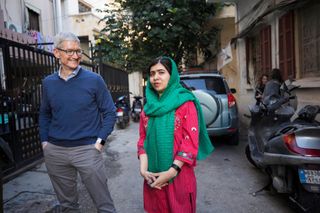Apple CEO Tim Cook on Malala Fund partnership: 'Our values align'

The tech giant announced Monday that it will become the first Laureate partner of the Malala Fund, which is led by Nobel Peace Prize laureate Malala Yousafzai and raises awareness around the right for equal opportunity in girls' education.
The tech giant said it will help the fund scale its organization to ensure every girl attends school and completes their education, as there are an estimated 130 million girls globally who are currently out of school. Cook will also be joining the fund's leadership council.
"(Malala and I) met and it was one of those rare moments in time where fairly quickly you realize how your values align. Not only the Malala Fund and Apple, but our personal values as well," Tim Cook said in an interview.
"One, equality is at the core of our belief and values and, two, that education is the great equalizer of people. If you believe both of those, it's not an extension at all to say, 'how do we help Malala achieve her vision of educating 130-million young girls around the world?'"
The Malala Fund expects to double the number of grants awarded by its Gulmakai Network and extend funding programs to India and Latin America with Apple's support.
"I love Malala's focus on secondary education."
"In particular, I love (Malala's) focus on secondary education," Cook said.
"So many girls around the world are getting to Grade 6 or Grade 7 and then stopping… This isn't right. It doesn't maximize potential and it doesn't treat people with dignity or respect."
Master your iPhone in minutes
iMore offers spot-on advice and guidance from our team of experts, with decades of Apple device experience to lean on. Learn more with iMore!
Cook was making a surprise visit in Toronto, Ontario, Canada where he dropped in on a group of Grade 7 students taking part of an Everyone Can Code workshop where they were learning how to make robots dance in the company's programming language Swift.
Apple has been providing free curriculum for schools to use to teach coding in the classroom as it has continually said it believes coding is the language of the future and an equalizer.
The company created Swift Playgrounds to reach kids around Grades 5 or 6, Cook said, then extending to Everyone Can Code to reach all K-12 students and moving into technical colleges that reach post-high school students before employment or many adults retraining for second careers.
"I've been shocked at how receptive the schools have been and how quickly they rolled out," he said.
"We have found a lot of great educators…that are there to serve kids and make sure that their achievements and dreams are fulfilled."
Josh McConnell is a technology commentator and reporter. He's been an editor at Financial Post and written for Globe & Mail, CBC News, and more. You can follow him on Twitter at @joshmcconnell.
Most Popular





